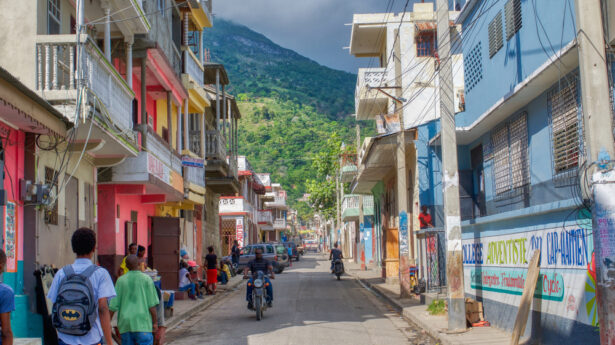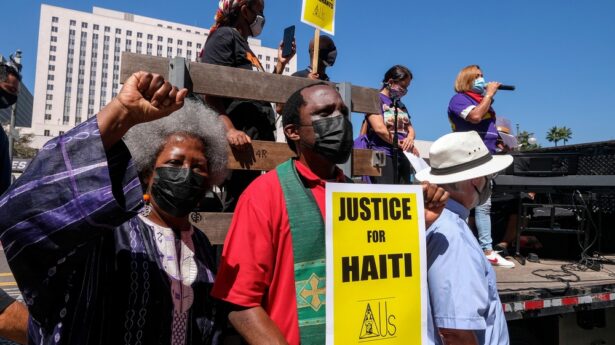The Unitarian Universalist Service Committee advances human rights through grassroots collaborations.
3 Facts About Anti-Haitian Racism in the U.S.

By Nafisa Abdinoor & Josh Leach on October 30, 2024
With just days to go before the November 5 presidential election, far-right politicians are still going out of their way to vilify Haitian immigrants—blaming them for a host of social ills they did nothing to cause. The most sensational of these slanders was, of course, a thoroughly- debunked rumor about Haitian immigrants eating household pets.
There is, of course, no truth to these accusations. But false rumors like these are able to gain traction in part because they pander to centuries-old prejudices against Haitians. In order to defeat these stereotypes today, we need to understand their origins. A new explainer from UUSC’s research team helps us do exactly that. Here’s what they found:
- Anti-Haitian Bigotry Traces Back to U.S. and European Colonialism
Haiti has an inspiring history, as the first independent country in the Americas to be led by formerly-enslaved people, who had successfully thrown off their colonial oppressors. But Haiti’s past has also been marked by tragedy and injustice. Colonial powers feared the example of an independent Black-led republic, and worked to destroy the new nation.
These attacks on Haiti’s independence and future took many forms. France and other European powers conspired to economically isolate the new nation and to saddle its government with ruinous debt. In the early decades of the 20th century, the U.S. government invaded and occupied Haiti, committing grave human rights violations in the process.
- Media Stereotypes in the Late 20th Century Exacerbated Colonial Prejudice
Largely due to this outside interference with its democracy, Haiti suffered under dictatorship and political instability in the 20th century. These social problems forced multiple waves of Haitian refugees to escape the country and head for the United States. U.S. officials responded by intercepting Haitian asylum-seekers and detaining them at Guantanamo Bay.
This pattern of outside exploitation set up a self-reinforcing dynamic in perceptions of Haiti. U.S. and European colonialism benefited from the false narrative that Haitians were incapable of self-government. And when this imperialism spawned social problems that forced Haitians to seek refuge, the U.S. media responded by recycling the same old colonial stereotypes.
- Communities Can Push Back Against This Racism Today
This history of colonialism and oppression prepared the soil for the kinds of racist narratives that right-wing politicians are pushing in the U.S. today. But Haitian immigrants and their non-Haitian neighbors are organizing to resist these false perceptions. UUSC’s research team provides examples of how to do so, ranging from political accountability to public education.
Meanwhile, UUSC’s partners are taking action in real-time. The Haitian Bridge Alliance (HBA), which serves the Haitian diaspora in the U.S., responded to Trump and Vance’s false claims in a way these men certainly didn’t see coming. Using a little-known provision in Ohio law, HBA petitioned for legal charges to be brought against them for knowingly defaming their community.
Take Action to Resist Hate
UUSC partners like HBA and our other allies will not let entrenched anti-Haitian bigotry go uncontested. When far-right politicians try to seize power by pitting our communities against each other, and spreading false narratives against our neighbors, we will work together to fight back. UUSC’s new research helps us point the way forward.
You can join us in this fight by signing up for our email list and making a donation to support our work. Your contribution in any amount helps us backstop our partners and equip their struggle for equal rights and justice—including for Haitian people in the diaspora and their home country. Together, we can make this historic and long-lasting prejudice truly a thing of the past.
Image credit: UUSC

